A glance at Prof Abdus Salam’s journey to becoming a Nobel laureate and the renowned Muslim scientist the world knows him as today
Ahmad Kamal, Student, Jamia Ahmadiyya International Ghana
“The world would listen”: Dreams and visions
In 1925, the modest town of Jhang, 200 miles west of Lahore, did not call for much attraction. Adorned with only the most basic amenities, the only sign of advancement was a railway line built by the British and a few creaking bicycles to be seen around. Then, in this same humdrum town, did a man called Chaudhry Muhammad Hussain see the most extraordinary dream. A dream that would be etched in his mind forever.
Gordon Fraser in his detailed biography of Abdus Salam writes:
“In his dream, Muhammad Hussain had seen that his child would be a boy, a first-born son who would bring glory to God and honour to his family. But he would not be a warrior or a rich merchant: his achievements would be through wisdom and intellect more powerful than any sword or amount of money”. (Cosmic Anger: Abdus Salam – The First Muslim Nobel Scientist, p. 2)
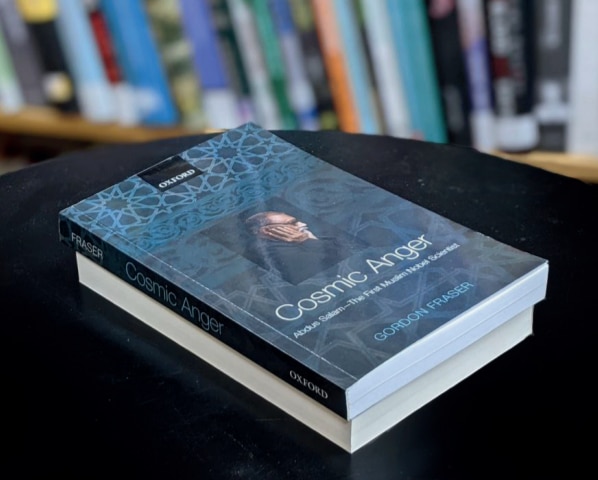
Soon enough in 1926, a boy was born in his house and named Abdus Salam. After his birth, Chaudhry Muhammad Hussain requested Hazrat Maulvi Ghulam Rasul Rajekira to pray for the child. In reply, “The maulvi foretold that the boy would one day speak so loudly that the world would listen”. (Ibid, p. 48)
Ahmad Salam (son of Abdus Salam) also narrates another dream seen by Chaudhry Muhammad Hussain Sahib regarding his son, Abdus Salam;
“[…] In another dream grandfather saw a young boy climbing a very tall tree that disappeared high up into the sky. When my grandfather called on this child to stop and come down, the child looked down and smilingly said ‘don’t worry father’ and continued so high that he became invisible.” (Salam + 50: Proceedings of the Conference, p. 70)
“The healthiest child”: Upbringing
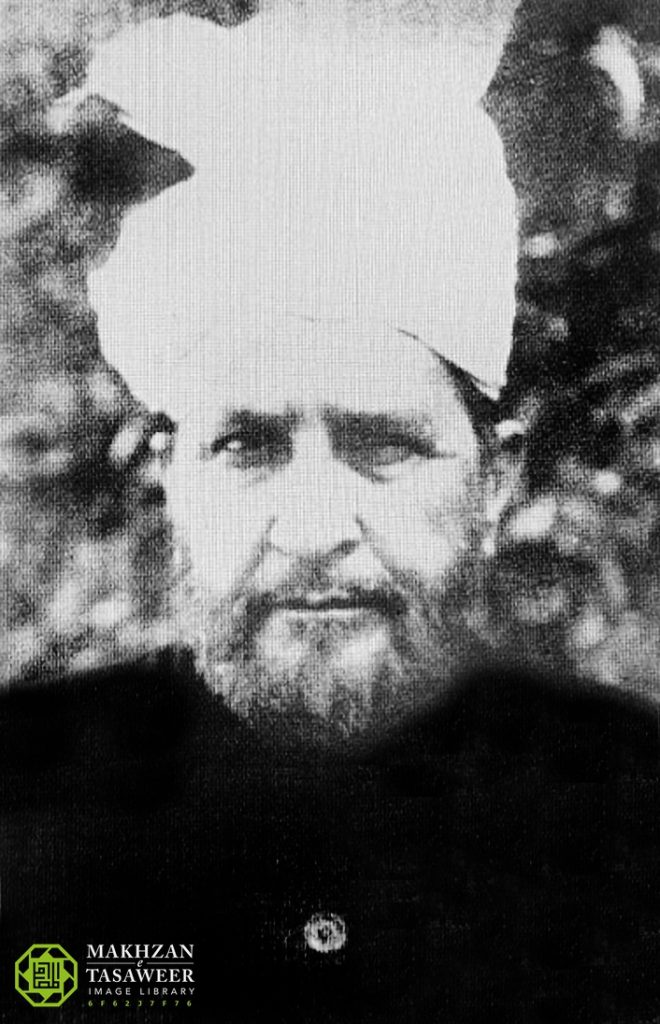
Chaudhry Muhammad Hussain Sahib worked hard as a school teacher for a meagre allowance. Despite the austere backdrop and him being borderline poor, he would try everything to make his dream a reality. Abdus Salam was thus excused from household chores that his sibling would partake in, plus he would be fed with the best meals. In fact, at the age of just two, he won his first award. His daughter fondly recollects;
“My father actually began his illustrious career by winning his first award at the age of two; for being the ‘healthiest’ or rather the ‘fattest’ baby in Jhang!”. (Ibid, p. 75)
Chaudhry Muhammad Hussain Sahib kept Abdus Salam intellectually stimulated as well. Being Muslims, Abdus Salam would learn to read the Holy Quran and memorise stories and poems. His father would personally tutor him and teach him to be ahead of the class. Gordon Fraser writes:
“One of Abdus Salam’s earliest memories was of learning the multiplication table for the number fifty. It is not a particularly difficult table to master, but on the other hand an accomplishment when most children are still learning to count to ten, let alone fifty.”(Cosmic Anger: Abdus Salam – The First Muslim Nobel Scientist, p. 49)
Highest ever score: Intellectual capabilities
In accordance with the dreams seen by Muhammad Hussain Sahib, Abdus Salam’s sharp intellect was apparent in his early years. He had no trouble comprehending seemingly difficult topics for his age. Zainab Mehmood writes:
“Since the early years, his power of comprehension astonished his parents. As a toddler when his mother narrated bedtime stories, he retained every word and whenever she repeated a story, he interrupted by saying ‘I already know it’.” (Dr Abdus Salam – The ‘Mystic’ scientist)
She further writes:
“He joined primary school in Jhang at age 6 where the Headmaster gave him a test and was so impressed by the precocious child that he admitted him straight to class four. Salam had no problem in catching up with students much older than him.” (Ibid)
Jhang was still years away from electricity when Abdus Salam was to sit for his matriculation examination. At night, he would have no choice but to learn under the lantern. This did not hinder Abdus Salam as he studied and made records.
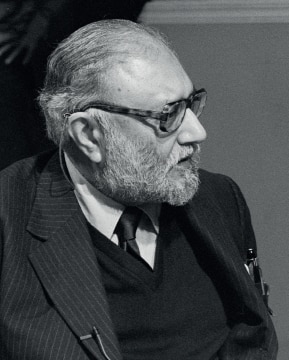
When Abdus Salam was 14, he managed to score the highest ever recorded marks in the University of Punjab’s matriculation. This earned him a bit of local recognition since traditionally, students from other Hindu schools would perform rather well as compared to the Muslim schools in the area. Gordon Fraiser writes:
“Salam recalled cycling home in the early afternoon, when the news of his standing first in the exam had already arrived. Passing through the city to reach his home, Hindu merchants who normally would have closed their shops in the afternoon heat stood outside to congratulate him”(Cosmic Anger: Abdus Salam – The First Muslim Nobel Scientist, p. 53)
The next day, a local newspaper also carried the picture of young Abdus Salam.
“A problem of Ramanujan”
Abdus Salam’s penmanship skills had already manifested itself when he was contributing pieces to the children section of the local newspaper. And when Abdus Salam was 17, he elegantly worked out a proof of one of Ramanujan’s problems, albeit first as homework. He then wrote a paper on it and titled it “A problem of Ramanujan”.
Srinivasa Ramanujan was an Indian mathematician who, despite having little education in the field of mathematics, managed to deliver novel contributions. But he died prematurely at the age of 32.
Abdus Salam’s first contribution to science was due to him. His proof was based on a concept propounded by Ramanujan himself. Abdus Salam’s paper was just two pages long worth of complex math equations. (https://fermatslibrary.com/s/a-problem-of-ramanujan)
Three pieces of advice from Sir Zafrulla Khan Sahibra
With pending decisions regarding the future of his son’s education, Chaudhry Muhammad Hussain Sahib wrote a letter to Hazrat Sir Zafrulla Khanra requesting advice. Zafrulla Khan Sahibra replied that:
“He would pray for Abdus Salam, and offered three pieces of advice: firstly, the boy should look after his health, for this was the foundation for all achievement; secondly, all lessons should be prepared for beforehand and revised immediately afterwards; and thirdly, that the boy should broaden his outlook, especially through travel.” (Cosmic Anger: Abdus Salam – The First Muslim Nobel Scientist, p. 54)
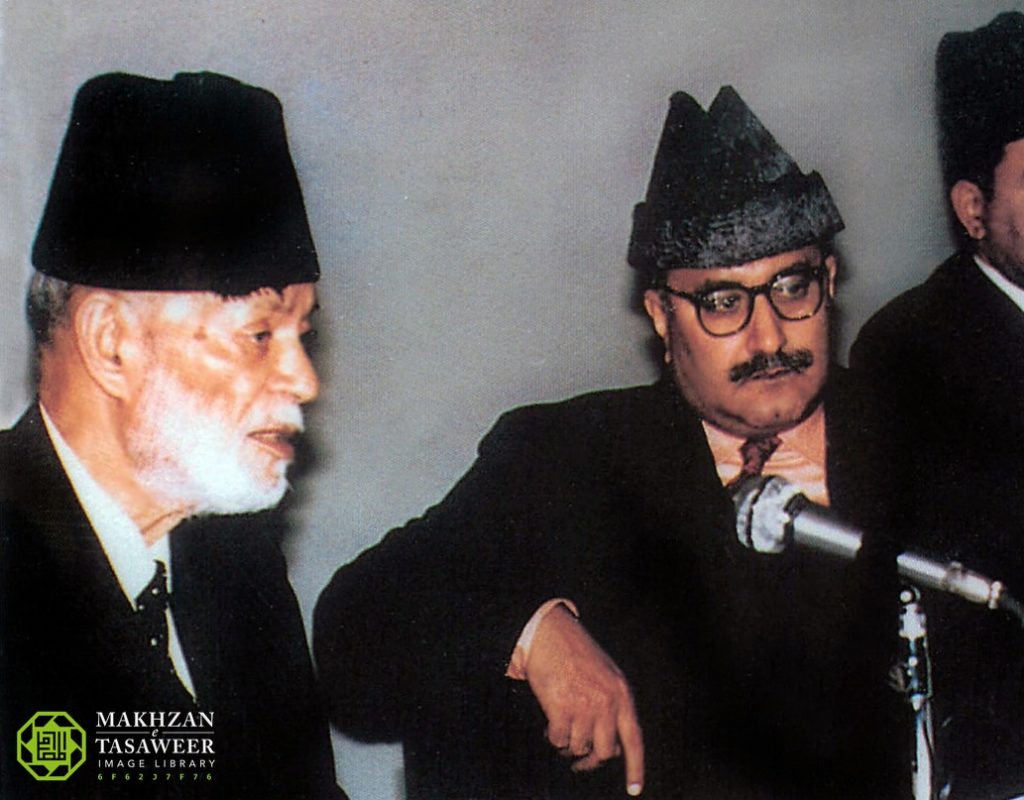
Their paths were destined to cross many more times in the future. Their first actual contact came at a dock in Liverpool when Abdus Salam Sahib first arrived in Britain.
“Salam stood with his huge trunk of mathematics books, well prepared for university study, but was totally unprepared for the British climate. He shivered in the early autumn chill. Seeing the student’s predicament Zafrullah Khan gave him his heavy overcoat and helped him with his luggage […] He stayed overnight with Zafrullah Khan at the Ahmadi London Mosque in Southfields, before making his way to Cambridge.”(Ibid, p. 72-73)
The death of his father (Chaudhry Muhammad Hussain Sahib) broke Abdus Salam Sahib. His father had been the single most influential man in his life. His death had caused much grief to Abdus Salam Sahib to the point that he even stopped eating properly. Gordon Fraser writes how Zafrullah Khan Sahib came to his rescue:
“Worried, his family sought help from Zafrullah Khan nearby. While accepting that grief is natural and normal, Zafrullah sternly admonished Salam for such exaggerated behaviour. Such shirk – idol worship – was un-Islamic. The warning brought Salam to his senses.”(Ibid, p. 190)
Later in America, they both visited the United Nations in New York where Zafrulla Khan Sahibra introduced Abdus Salam Sahib to the world of international diplomacy and politics. This was of tremendous help as later in his life, he set up the International Centre for Theoretical Physics in Italy.
“The Prophet at home”
Another memorable meeting between these two occurred when once Zafrulla Khan Sahibra was admitted to hospital. Concerned, Abdus Salam Sahib went to the hospital to meet him. As a gift, he brought him one of his favourite books, a book of hadith called Shamail-al-Tirmidhi. He also expressed his desire to translate the book one day.Zakaria Virk writes about what further ensued:
“Next time Dr Salam visited Sir Zafrulla at the hospital, he gave him a printed copy of the translation with this dedication: ‘With deep gratitude to Abdus Salam, eminent physicist, with whom the idea of this book originated.’” (Dr Abdus Salam – His Faith and His Science)
Zafrullah Khan Sahibra had managed to translate the book whilst he was still in the hospital! It was published under the name, The Prophet at Home.
“Declared non-Muslim, cannot cope”
In 1974, in Pakistan, the Ahmadiyya Muslim Community was officially declared as non-Muslims due to their beliefs. This development in Pakistani politics sent a ripple of distress through the hearts of Ahmadi Muslims worldwide, particularly Abdus Salam.
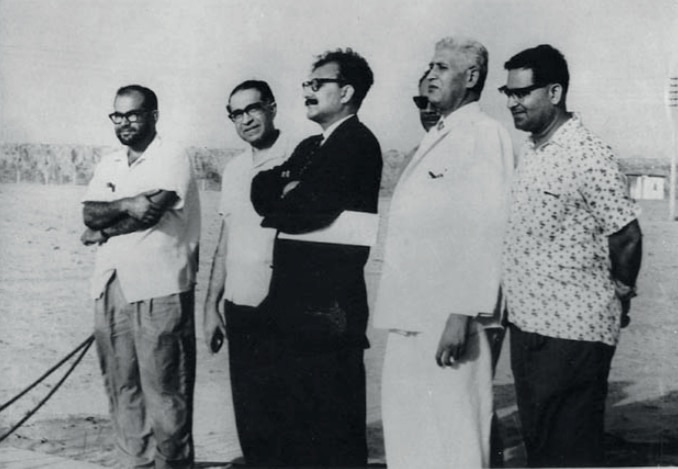
Abdus Salam Sahib was devastated at the news because science and religion were the two cornerstones of his life. It is on record that Abdus Salam’s diary entry for that day read: “Declared non-Muslim, cannot cope”.
As a muslim, in keeping with the practice of the Holy Prophetsa , he decided to take certain steps. As Gordon Fraser notes:
“To underline his personal pride in being Muslim, he grew a beard and assumed the prophetic forename ‘Muhammad’.” (Cosmic Anger: Abdus Salam – The First Muslim Nobel Scientist, p. 249)
He would be from now on known as Professor Dr Mohammad Abdus Salam.
A Prolific Reader
Abdus Salam’s love for reading cannot easily be imagined. He had a wide reading spectrum, where books such as Teach Yourself Air Navigation could be found on his bookshelf. Whenever he could, he would go looking for books and return with a bag filled with books. Every room in his house had shelves filled with books and not even the bathroom was spared. His daughter recollects:
“He loved to buy books, old and new. There was no room in our house, including the bathroom that did not have bookshelves in it, filled with books on every subject. My father would come home from travelling the globe with his suitcases splitting from the weight of the books he had bought, and my mother would worry about where to put them”. (Salam + 50: Proceedings of the Conference, p. 77)
Even with age, his love for books never faded away; even in the latter part of his life when, due to medical conditions, his movement was restricted. His son recollects:
“He would spend a great deal of time in these bookshops and I recall even when he was confined to a wheelchair, that I would take him through the bookshop at Heathrow so he could choose books and magazines which he would buy with an obligatory bar or box of chocolates. As children we were always encouraged to read extensively and were always allowed and encouraged to try as many books as we wanted” (Ibid, p. 72)
A fortune teller
Despite his busy engagements, Abdus Salam Sahib never missed a chance to have some fun. His daughter recollects:
“Soon after I went to Putney High, the school held a fundraiser. Having just read a book on palmistry, my father volunteered his services as a palm reader and dressed in his sherwani and turban, which was the hit of the fete. I wonder how many people who had their palms read that day would have believed that the palm reader was a future Nobel Laureate!” (Ibid, p. 76)
Not interested: Meeting Einstein
In 1950, Abdus Salam was invited to study in America at Princeton University. Coincidentally, the famous Albert Einstein was also present at the time in the campuses of Princeton. Zakaria Virk, in a speech, narrated an anecdote about these two scientists:
“When Prof Salam was studying in Princeton, New Jersey, one day, he met Prof Einstein casually on the campus of Institute for Advanced Study. Einstein asked him, ‘What kind of research are you doing?’ Salam replied, ‘I am working on the renormalization theory.’ Einstein said, ‘I am not interested in that.’ After a few moments, Einstein asked, ‘Have you studied my Relativity theory?’ Salam replied, ‘I am not interested in that.’” (Dr Abdus Salam, Champion of Science in the Third World, p. 5)
Always taking notes: Lunch with the Queen
Abdus Salam’s work consumed him; his mind was always at work, thus he was always brimming with ideas. For this reason, nothing capable of holding ink was spared. Scraps of paper, envelopes, posters, napkins on planes, trains and cars were all used to note down his ideas. Be it dinner or perhaps even a lunch with the Queen.
Abdus Salam Sahib once had the opportunity to lunch with her Majesty, Queen Elizabeth, and Prince Philip along with a few other guests. His son recollects:
“After the lunch when her Majesty, the Corgis and all the other guests had left, he popped back into the room to ask if he could have the napkin as he had written some notes on it.”(Salam + 50: Proceedings of the Conference, p. 70)
His commitment to his work cannot be understated. The late Imam BA Rafiq Sahib of London once also had a similar encounter.
Abdus Salam Sahib used to normally sit in the front row during the Friday sermons. Bashir Rafiq Sahib, whilst giving the sermon, would see Abdus Salam Sahib take out a notebook and begin to write in it. Bashir Rafiq Sahib was delighted with the fact that Abdus Salam Sahib had heard something worthy of been noted.
Zakaria Virk writes:
“One day Mr Rafiq asked him, ‘Sir you must find my sermons very informative that you keep taking notes.’ Dr Salam replied, ‘Sometimes I get ideas like a flash of light, or an electric current. If I don’t jot these ideas down right away, chances are I will forget them. These flashes of intuition are very basic to my research.’” (Dr Abdus Salam, Champion of Science in the Third World, p. 7)
The Muslim Gospeler
Abdus Salam was often smartly dressed. He was always seen in dark suits no matter the occasion or the weather, but on the prestigious occasion of his Nobel Prize ceremony, he retraced his cultural roots.
Gordon Fraser writes:
“Camera lights flashed as a stocky bearded man with a turban and gold khussa shoes, pointed like twin crescent moons, stood up to receive the prize for physics. […] It was a careful statement of pride and humility: pride that a son of such a modest Third World town should attain the highest accolade of science, and humility in remembering these modest beginnings”(Cosmic Anger: Abdus Salam – The First Muslim Nobel Scientist, p. 9)
Abdus Salam Sahib had found religion and science to be in harmony with each other. Well aware of his position and place in history, he attempted to reconcile them for they had gone their separate ways. He started his Nobel Prize speech with verses of the Holy Quran.
“Abdus Salam was mindful that he was a scientific ambassador of Islam. Few people in Stockholm knew the impact that Islamic scholars had made on the progress of science. Salam, resplendent in his turban, saw himself as a Muslim gospeller, restoring nameplates in the pantheon of science that had become obscured or even illegible.”(Ibid, p. 10)
In 1973, he also proposed to Pakistan’s government to set up an Islamic Science Foundation. Fraser writes:
“The proposal led to a loose association of Muslim scientists ‘Ummatul-Ilm’ (Community of Science) that first met at Trieste at Salam’s suggestion in 1980.” (Ibid, p. 199)
Even when he addressed the UN symposium in Kuwait in 1981, Abdus Salam Sahib recalled the glory of Islamic science, when intellects like Al Haytham, Ibn Sina, and Al Biruni had widened the view of the world centuries before Newton.
Abdus Salam Sahib also gave a speech at a UNESCO conference which was later published as a book, titled, Renaissance of Sciences in Islamic Countries, but despite his tireless travels to reduce the growing gulf between Islam and science, the renaissance could never take off.
“Toddlers play at the feet of Nobel laureates”
Abdus Salam Sahib arrived in Stockholm with his family to attend the Nobel Prize ceremony, but were informed of a longstanding rule which prohibited the entrance of children into the ceremony. But at the request of Abdus Salam Sahib, this rule was overlooked and thus, his grandchildren were allowed to attend. His daughter narrates:
“The next day, there were more pictures of the two grandchildren in the newspapers than of the Nobel Laureates, with the headline ‘Toddlers play at the feet of Nobel Laureates.’” (Salam + 50: Proceedings of the Conference, p. 78)
Humility: “This is for you”
After being awarded the Nobel prize, Abdus Salam Sahib toured India and Pakistan. His actions would forever speak volumes of his humility. Tasneem Zehra Husain writes:
“He sought out his primary school teacher, who was by then so old he could not even sit up. Salam put his Nobel prize on his teacher’s chest and said ‘this is for you.’” (What Remains Invariant: Life Lessons from Abdus Salam, p. 22)
His son also narrated with regard to the Nobel prize money:
“I am not sure that many of you know that the Nobel Prize money was put into a charity in memory of my father’s parents for the education of young children in developing countries, irrespective of colour, creed, or nationality. That fund still exists in a small way today”. (Salam + 50: Proceedings of the Conference, p. 70)
Prior to the Nobel Prize money, he used his cash rewards for the benefit of deserving students. Zainab Mehmood writes:
“Dr Salam won 274 awards, degrees and prizes most of which carried substantial cash rewards. He used all his prize money to create a scholarship fund for deserving students as well as to aid impoverished people. He would purchase books and laboratory equipment for various Lahore universities and answer hundreds of letters he received from eager students despite his busy schedule.” (Dr Abdus Salam – The ’Mystic’ scientist)
During his time as a lecturer in Cambridge, he never forgot his teachers back in his homeland. Zainab Mehmood notes:
“He regularly sent money to his retired and impoverished teachers in Jhang. He held all his teachers in the highest of esteem […] he insisted that all his Hindu and Sikh teachers who had migrated to India, should be invited to all functions arranged in his honour. He met them with great humility and gratitude. He went so far as to visit one of his old teachers, Dr Ganguly, who was suffering from cancer, at his home, accompanied by a senior Indian government official who presented the professor with a certificate and cash reward” (Ibid)
Three ambitions of Dr Abdus Salam
In the end, Gordon Fraser has listed three ambitions which summarised the pursuits of Professor Abdus Salam:
“1. to make fundamental discoveries in science and understand better Allah’s work;
2. to enable isolated researchers from developing countries to interact and become intellectually energized without having to emigrate; and
3. to improve the status of modern science in Islamic countries.” (Cosmic Anger: Abdus Salam – The First Muslim Nobel Scientist, p. 284)
Abdus Salam Sahib had spent his entire life chasing these ambitions, but despite his services to the religion of Islam, his tombstone had initially read “Abdus Salam, the First Muslim Nobel Laureate”, but was vandalised due to the prejudice which continues to plague his fellow countrymen in Pakistan. They removed the word “Muslim” from his tombstone for they would not let him be, in his life or death.

